Britons desperate to get away have been rushing to arrange staycation plans as Boris Johnson announced domestic getaways could reopen once more from the second week of the Easter holidays.
Holidaymakers desperate for some respite from the coronavirus crisis are scrambling for bookings closer to home as the country begins to pave its way out of the national lockdown.
It comes as figures released by Avvio, which provides technology to more than 500 hotels around the world, revealed the demand for hotels in August has already risen by a whopping 239 per cent and July by 166 per cent.
The data, which was released today, also showed the revenue for June is up by 63 per cent.
Earlier today, Boris Johnson unveiled his ‘roadmap’ out of the lockdown in a statement to the Commons and warned the ‘threat remains’ and cases, hospitalisations and deaths will rise in the coming months.
Under the new plans, campsites and domestic holiday lets can reopen for single households from April 12 – but international travel is completely off the cards until at least May 17.
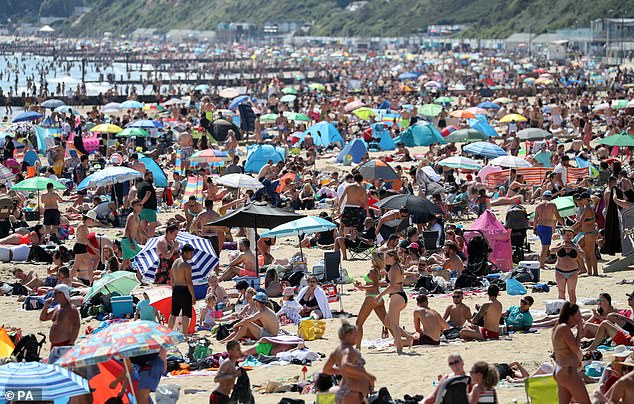
Britons desperate to get away this summer have been arranging high-end staycation plans in the UK. Pictured: Bournemouth beach

Boris Johnson unveiled his ‘roadmap’ out of the lockdown in a statement to the Commons this afternoon
Announcing his plans, the Prime Minister said: ‘The threat remains substantial with the numbers in hospital only now beginning to fall below the peak of the first wave in April.
‘But we are able to take these steps because of the resolve of the British people and the extraordinary success of our NHS in vaccinating more than 17.5 million people across the UK.’
Mr Johnson said there would be a five-week gap between the main steps in the roadmap and explained it would take four weeks to assess the impact of each step.
‘I won’t take that risk,’ Mr Johnson said.
‘I understand their frustration and I sympathise very much with the exhaustion and the stress that people are experiencing and businesses are experiencing… but to them I say the end really is in sight.’
As holidaymakers rush to make bookings, Avvio’s Chief Commercial Officer, Michael De Jongh, said the company had seen a surge in holidaymakers booking hotels in the UK, with the average price being spent for a seven-day stay hitting £1,743.
He said: ‘We’ve all had a tough year and people are desperate to get away this summer.
‘Many consumers feel it’s too risky to book a foreign holiday, so they’re using the money they would have spent going abroad to treat themselves to an incredible stay at a 4 or 5-Star hotel in the UK instead.
‘It may well be the first time many of them have stayed in such a high-end hotel.
‘Of course none of us can be 100 per cent sure what the situation will be like by the summer, but so long as consumers make sure they can amend or cancel their booking easily, they won’t be left financially worse off if lockdown continues longer than anticipated.’
Among the most popular hotel sites being snapped up by Britons so far are the Grand Eastbourne in East Sussex, Rudding Park Hotel in Yorkshire, Crieff Hydro Hotel in Scotland and Lough Erne Resort in Northern Ireland.
The figures by the property site also showed that staycation bookings were also booming across all types of hotels and self-catering accommodation, with August hotel and self-catering bookings up 91 per cent ahead of last year.
Visit Cornwall tourist board has also revealed that bookings for summer by February are up by 50 to 100 per cent compared to last year, The Telegraph reports.
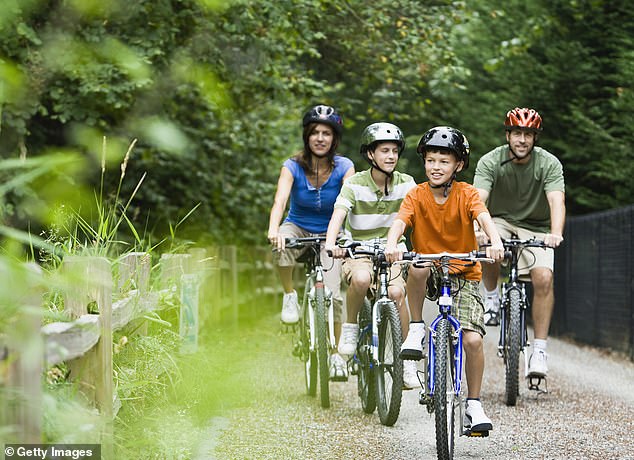
Under the Government’s new ‘roadmap’, campsites and domestic holiday lets can reopen for single households from April 12
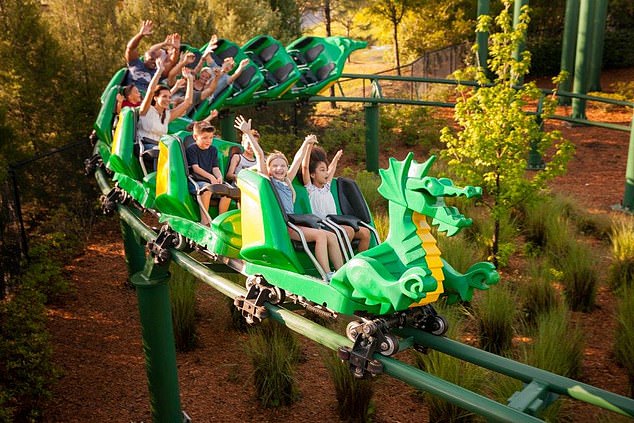
From April 12, theme parks, gyms, zoos and libraries will also be able to open in the country. (Stock image)
Similarly, Airbnb has seen double the number of people on the hunt for staycations than last year.
In response to the latest announcement, an Airbnb spokesperson said: ‘The Great British staycation is back and hosts across the UK are ready to provide clean and private homes for families and loved ones to safely reconnect.
‘The Government’s announcement is also welcome news for new and potential hosts looking to boost their earnings, as everyone looks forward to a brighter future.’
July also saw a 45 per cent rise from last year in bookings and September was up by 36 per cent.
Avvio also revealed that there had been a 58 per cent surge in extended families booking summer hotel and self-catering staycations together,.
The data comes after it was revealed that hotels across the country had started to reap the rewards of the increasing number of Brits looking to take a break while staying close to home.
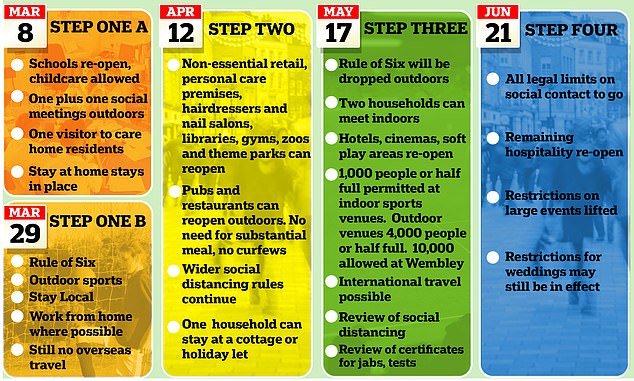
Holiday operators regularly hike prices for Easter to make the most of high demand, but this year it seems extremely high compared to a few weeks before.
At Butlins Bognor Regis in Somerset for example, a Gold Apartment for four people is on offer for a week from March 19 for £318, but £1,353 from April 2 – an increase of £1,035 or 325 per cent.
The same room is available for a week from July 12 for £1,048 – rising to £1,701 from July 26, after the summer holidays start, an increase of £653 or 62 per cent.
Butlins is currently offering summer holidays for ‘£270 per break’. At the same point last year, an archived version of its website shows it was offering summer summer holidays ‘from £235 per break’. This means its minimum price is up £35 or 15 per cent at the same point this year.
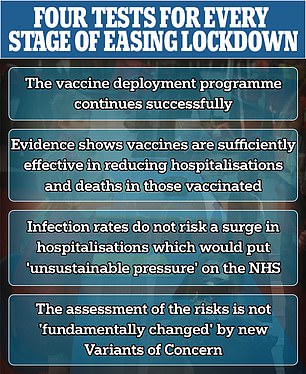
Meanwhile at Center Parcs in Woburn Forest, Bedfordshire, a two-bed Woodland Lodge for seven nights from March 19 is £978, while from April 2 it is £2,498 – a rise of £1,520 or 155 per cent.
The same accommodation at the site for seven nights this summer is £1,608 from July 12 or £2,178 from July 26 – an increase of £570 or 35 per cent.
As for Haven, a standard caravan for seven nights at its Riviere Sands resort in Cornwall is on sale from March 19 for £186 or from April 2 for £502 – a rise of £316 or 170 per cent.
In his address to the Commons today, the Prime Minister revealed that his first steps to freedom would be to prioritise getting children fully back into classrooms in a fortnight’s time, while people will also be able meet one friend or family member in the park for a coffee or a picnic from March 8.
The next stage of loosening will not be until March 29, when the Rule of Six will make a comeback – and be extended to allow two households to gather, enabling relatives to meet properly for the first time in months.
That date will also see the reopening of tennis courts and golf courses and the return of grassroots football.

The Grand Eastbourne in East Sussex was among the top four popular locations that Britons are travelling to
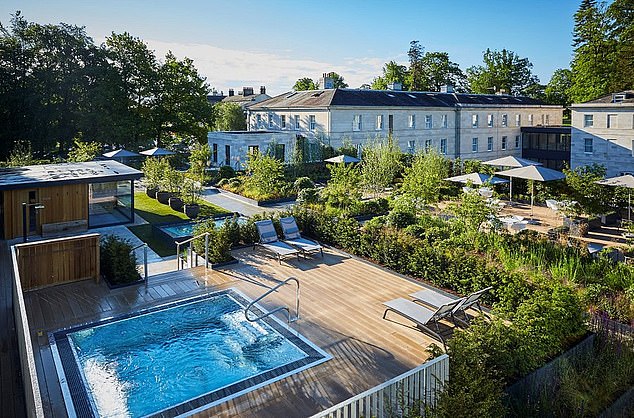
Figures showed that Rudding Park Hotel in Yorkshire was also among the most popular staycation sites in the UK
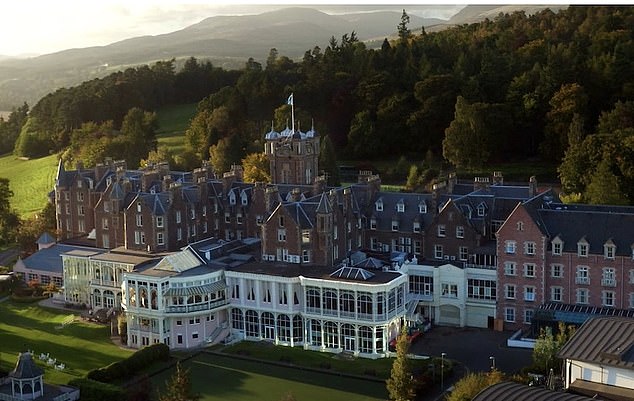
Crieff Hydro Hotel in Scotland has seen a surge in revenue and bookings this summer
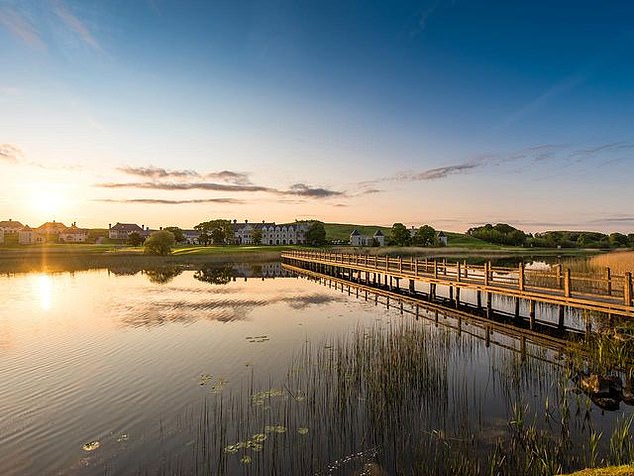
Lough Erne Resort in Northern Ireland is among the most popular staycation sites in the country
But shops, hairdressers and pubs must remain closed until April 12 at the earliest – the same time gyms can get back up and running – regardless of mounting fears about the economic meltdown.
Campsites and holiday lets can reopen for single households from April 12 – but international travel is completely off the cards until at least May 17.
From this date theme parks, gyms, zoos and libraries will also be able to open.
Social distancing rules will stay in force until June 21 at the minimum, with a government review to decide their future after that.
Sports can start to return from May 17, although venues will need to work on reduced capacities.
Up to 30 people can go to weddings from the same date, but are stuck at that number until the next phase of the roadmap.
Mr Johnson will say today that further restrictions will be lifted in the weeks after March 8, as long as the four tests designed to keep the pressure off the NHS keep being met.
They are that: the vaccine deployment programme continues successfully; evidence shows the jabs are effective at reducing hospital admissions and deaths; infection rates do not risk a surge in hospital cases; and no risky new variants emerge.
How will lockdown ease in the roadmap?
Step One Part One: March 8
From March 8, all pupils and students will return to schools and colleges across England.
So-called wrap-around childcare will also be allowed to resume, paving the way for after and before school clubs to reopen.
People will be allowed to meet one other person outside for recreation, for example, to have a picnic or to meet for coffee.
Care home residents will be able to have one regular named visitor.
The Government’s stay at home order will remain in place, with travel for non-essential purposes still banned.
Step One Part Two: March 29
From March 29, outdoor gatherings of up to six people or a larger group from up to two households will be allowed. These gatherings will be allowed to happen in private gardens.
Outdoor sports like tennis and basketball will be allowed to reopen and people will also be able to take part in formally organised outdoor sports.
It is at this point that the Government’s stay at home guidance will end, to be replaced by ministers encouraging people to ‘stay local’.
However, the Government is expected not to define what constitutes local, instead choosing to rely on people using their common sense to decide on journeys.
People will still be told to work from home wherever possible while international travel will still be banned unless it is for essential purposes.
Step Two: April 12
Nom-essential retail will be allowed to reopen as well as personal care premises like hairdressers, barbers and nail salons.
Public buildings like libraries, museums and art galleries will be allowed to welcome back customers.
Meanwhile, hospitality venues and outdoor attractions like theme parks will be given the green light to reopen in some form.
However, there will still be rules on household mixing: Essentially any activity which involves being indoors will be restricted to members of the same household.
Gyms and swimming pools will also reopen from April 12 but only on the basis that people go on their own or with their own household.
Pubs and restaurants will be able to reopen but at this point they will only be able to have customers outdoors.
Any visits to a pub or restuarant will have to comply with the rules on social contact, so no more than two households or the rule of six.
The Government will not be bringing back the old requirement for people to order a substantial meal with alcohol while the old 10pm curfew will be ditched.
All customers at hospitality venues will also have to be seated when they order food or drink, with ordering at the bar prohibited.
Campsites and holiday lets where indoor facilities are not shared with other households can also reopen but trips must be restricted a single household.
Funerals will be allowed to continue with up to 30 people, while the rules on wedding receptions will be eased to allow the number of guests to increase from six to 15.
Step Three: May 17
The two household and rule of six requirements for outdoor gatherings will be ditched but gatherings of more than 30 people in places like parks will still be banned.
Crucially, mixing indoors will be allowed again. The rule of six or a larger group from up to two households will be allowed to meet.
However, this will be kept under review by ministers to see if rules could be relaxed still further.
This is also the point at which pubs and restaurants and other hospitality venues will be able to open indoors, with the rule of six and two household limit in place. But groups meeting outdoors at pubs will be allowed to be bigger.
Entertainment venues like cinemas and children’s play areas will be able to reopen, as will hotels and B&Bs. Indoor adult sports groups and exercise classes can also reopen.
Changes will also be made to sporting and performance events in indoor venues with a capacity of 1,000 people or half full
Advertisement
Source link : https://www.dailymail.co.uk/news/article-9287131/Lockdown-weary-Brits-splashing-staycation-plans.html












